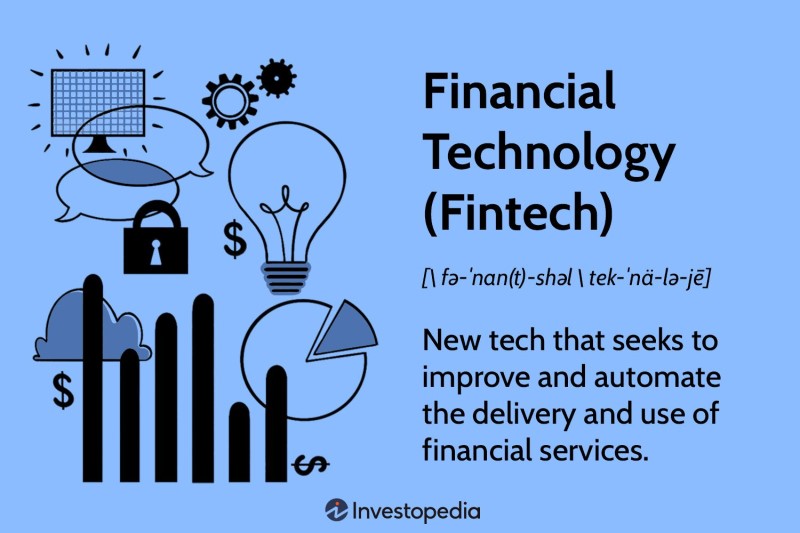Financial technology, or FinTech as it is commonly referred to, utilizes cutting-edge technology to provide a vast array of financial products and services.
Its primary goal is to simplify the payment process for consumers by offering multi-channel, swift, and convenient options.
FinTech is useful in a variety of business sectors, such as investment management, mobile payments, lending, fundraising, and money transfer.
The explosive growth of financial technology has been highly advantageous for consumers globally, enabling businesses to cater to previously underserved clients, lowering costs, and increasing competition.
Several benefits are associated with financial technology. One of the most significant advantages is improved payment systems.
By leveraging this technology, businesses can efficiently issue invoices and collect payments, which enhances their accuracy and efficiency.
Additionally, the professional services offered help improve customer relations, which boosts customer loyalty.
Another benefit is the rate of approval, which is higher when small business ventures use alternative lenders in financial technology.
Wait Here and Click Continue Button
Encrypting your link and protect the link from viruses, malware, thief, etc! Made your link safe to visit.
Well done! you have successfully gained access to Decrypted Link.
This method is highly accessible, and the capital can be disbursed within 24 hours, a much faster turnaround time than traditional lenders.
Moreover, financial technology companies leverage mobile connectivity to offer greater convenience to customers.
This significantly increases the number of people who can access these services and enhances transaction efficiency.
The use of smartphones and tablets to manage finances enables businesses to streamline their services and deliver an overall superior customer experience.
Furthermore, many financial technology systems utilize robo-advice to provide quick and low-cost guidance on finances, reducing exposure to risk.
However, it may not offer the in-depth advice that professional advisors provide.
Finally, financial technology companies invest heavily in advanced security features, including biometric data, tokenization, and encryption, to safeguard customer data and instill confidence in using these services.
Financial Technology Software: Revolutionizing the World of Finance

The world of finance is undergoing a transformational change. The rise of financial technology or “FinTech” is transforming traditional financial services by combining innovative technology with financial services to create new products and services.
One of the key drivers of this revolution is the development of financial technology software. In this article, we will explore what financial technology software is, how it works, and its impact on the financial services industry.
What is Financial Technology Software?
Financial technology software refers to computer programs or applications that are designed to facilitate financial transactions, automate financial processes, and provide financial services to customers.
These software programs are developed by FinTech companies, which are technology companies that provide financial services.
FinTech companies use financial technology software to develop and offer a range of financial products and services, including digital wallets, payment gateways, online lending platforms, and investment management tools.
How Does Financial Technology Software Work?
Financial technology software is designed to make financial transactions more efficient and convenient. For instance, digital wallets are a type of financial technology software that allows users to store their payment information on their mobile devices. With a digital wallet, users can make payments quickly and easily using their smartphones or tablets.
Payment gateways are another example of financial technology software that simplifies the payment process. Payment gateways are online payment systems that allow businesses to accept payments from customers using credit cards, debit cards, or other payment methods. Payment gateways are integrated with e-commerce websites and online marketplaces, making it easy for customers to make payments.
Online lending platforms are another type of financial technology software that is changing the way people access credit. These platforms connect borrowers with lenders, allowing borrowers to access loans quickly and easily. Online lending platforms use algorithms to assess borrowers’ creditworthiness, reducing the time and costs associated with traditional loan applications.
Finally, investment management tools are a type of financial technology software that allows users to manage their investments online. These tools provide users with real-time information about their investments, allowing them to make informed decisions about buying and selling securities.
Impact of Financial Technology Software on the Financial Services Industry
Financial technology software is revolutionizing the financial services industry in several ways. Firstly, it is making financial services more accessible to people who were previously underserved by traditional financial institutions. For instance, online lending platforms are providing access to credit for people who may not have had access to traditional loans due to their credit history or other factors.
Secondly, financial technology software is making financial services more efficient and cost-effective. For example, payment gateways are reducing the costs associated with payment processing for businesses, while investment management tools are reducing the fees associated with traditional investment management.
Thirdly, financial technology software is driving innovation in the financial services industry. FinTech companies are using financial technology software to create new products and services that are changing the way people access and use financial services. For example, digital wallets are creating new opportunities for mobile payments, while online lending platforms are creating new opportunities for peer-to-peer lending.
Challenges and Opportunities for Financial Technology Software
While financial technology software is transforming the financial services industry, it is also facing several challenges. One of the main challenges is regulatory compliance. Financial technology companies must comply with regulations governing the financial services industry, which can be complex and vary from country to country.
Another challenge is cybersecurity. Financial technology companies must ensure that their software is secure and that customer data is protected from cyber threats.
Despite these challenges, there are also opportunities for financial technology software. The global financial services industry is expected to continue to grow, and financial technology software is poised to play an increasingly important role in this growth. FinTech companies are investing in research and development to create new financial technology software that can help drive growth in the industry.
